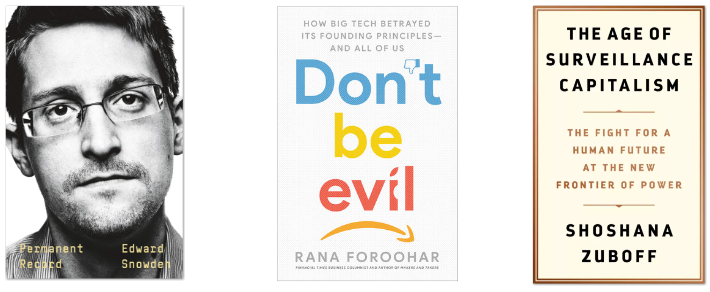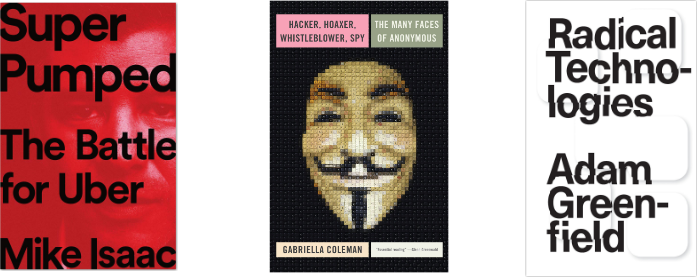Within the bubble of technologists, the future looks bright and exciting. Outside of it, worried scholars and publicists have written a lot of books about the dangers of Big Tech, surveillance and the power of the market. This is a list of some interesting reads to better understand the impact of technology on society.
This may sound depressing, and it is, to some extent. The world is doomed and it is technologists’ fault! But when we understand better how technology, the tech sector and “computational thinking” fit in the context of society, it will get easier to decide whether we should push back.
As always, this reading list is what I happened to read on the subject, there are lots of other interesting publications out there.
How power dynamics changed
I already wrote about The Age of Surveillance Capitalism before, but I wanted to re-include it here. This book really ought to be the first item on a list of books about how tech impacts society. It defines “surveillance capitalism” and shows its workings in great detail. As I said in my review, it is not a quick read, but absolutely recommended for anyone who works in tech. We’ve got to understand this if we want to make things right.
The Age of Surveillance Capitalism by Shoshana Zuboff

A critique of “disruptive” technologies
In his fantastic Radical Technologies, “to be played at maximum volume” as the last page says, Adam Greenfield explains and critically evaluates a wide range technologies that are supposedly the future, including internet of things, augmented reality, blockchain, 3D printing and machine learning. His angle is not “wow, exciting!”, but ”what is this, is it really as good as promised, and how will large-scale deployment impact society?”. I wish we would all adapt the same mindset when assessing new tech, because there are many reasons to oppose these “radical” technologies. Blockchain doesn’t scale, internet of things devices have major security and privacy implications and machine learning is, despite many practical applications, often not fully misunderstood (as people tend to forgot that data is not neutral, not objective and always a subset of reality). The book ends with a number of future scenarios, ranging from utopias to dystopias, which help ask the question: “what do we want a tech-driven society to look like?”
Radical Technologies by Adam Greenfield
Has Big Tech lost its soul?
Many of Silicon Valley’s big companies once started with idealistic mantras and values, like ‘Don’t be evil’ and ‘Information wants to be free’, but the tide has turned. The book shows how (excerpt from the cover):
a world where “information wants to be free” became one in which we are the product being monetized, how the geeks tinkering with motherboards in their basements grew to be arrogant billionaires monopolizing the lion‘s share of the economy, and how the “democratized” internet we were promised can threaten the very fabric of our democracy.
Foroohar brilliantly explains where it went wrong. Tech companies made their products extremely addictive with the help of behaviorist psychology. Secondly, they have become monopolies in ways we haven’t seen before by both creating the market and operating in it. Thirdly, they got heavily involved in government with far-reaching lobbying for tax cuts and deregulation and by lending their targeted advertising platforms (as well as their consultants (!) for advice) to political campaigns. All of this is enabled and strengthened by surveillance capitalism.
Foroohar backs up her arguments with extensive research, and provides solutions, too. Is it depressing? Well, slightly, but it certainly left me with the feeling that having the picture painted so clearly will help address it.
Don’t Be Evil - The Case Against Big Tech by Rana Foroohar
What government surveillance looks like
The extent of Big Tech’s collection of personal data may be extraordinary, but the government’s mass surveillance programs are as disturbing, as Edward Snowden’s 2013 revelations have shown in great detail. In Permanent Record, Snowden tells two histories: that of his own growing up and that of how the intelligence community (IC) got more and more powerful after 9/11. I found the personal stories interesting, the analysis thorough and the details thought-provoking. He makes useful semantic distinctions; for instance, he explains how metadata is more intimate than content data, because we create it unknowingly, rather than thoughtfully. The book is full of wordplay… a “permanent record” is what this book is of Snowden’s life, but also what the intelligence communmity keeps of every citizen. “Hacking” is what Snowden used to do as a kid to minimise time spent on homework, but also what would become part of his work and revelations.
Permanent Record by Edward Snowden
The impact of tech company culture on society
Super Pumped is New York Times journalist Mike Isaac’s book about Uber. It gives detailed accounts of the company’s founder, culture and attitude. Three things that are are, it turns out, closely interrelated. The book’s odd name is literally one of Uber’s corporate “values”, and yes, I too was surprised to read that this company has those (given the plethora of scandals on so many different aspects of human dignity). There are the accounts of bad things that happened, but then there’s also how the company tried to cover those bad things by hiring prominent PR firms. I understand… every organisation above a certain size will have people who work to maintain and defend the company’s public image. Sure. But this book shows it clearly Uber doesn’t care, the company carries out an agenda that benefits few and hurts many, and has its bro-y culture leak into society in many bad ways. This has definitely put Uber on the top of my list of companies I would never want to work for.
Super Pumped by Mike Isaac

Political activism through technology
When an anthropologist studies a hacker slash activist movement, it might just yield a super interesting book about online culture. Hacker, Hoaxer, Whistleblower, Spy by Gabriella Coleman is a investigative study of Anonymous, with a look into what they do, want and think, completed with IRC logs, which I think were a great way to provide a look into online culture. Sometimes she talks a little too much about herself, but I feel it kind of works in this context. This book gives some interesting insights into Anonymous, the “lulz” and the motivations between some of the group’s core members.
Hacker, Hoaxer, Whistleblower, Spy: The Many Faces of Anonymous by Gabriella Coleman
Comments, likes & shares
No webmentions about this post yet! (Or I've broken my implementation)